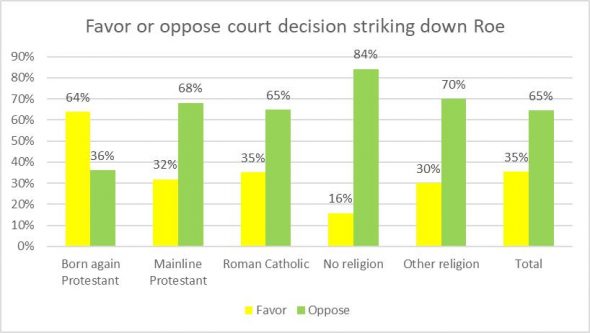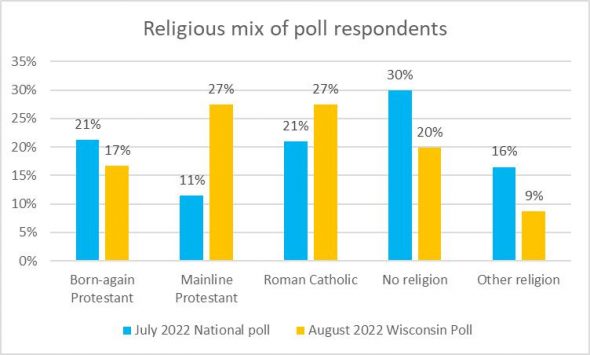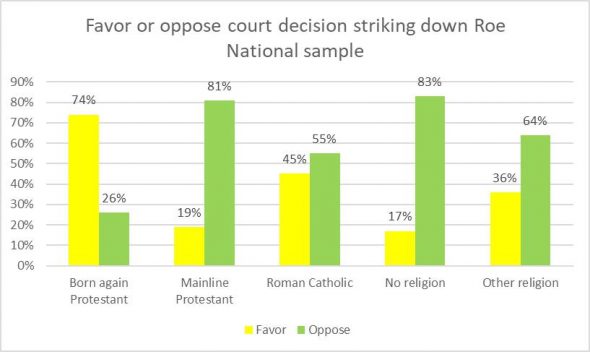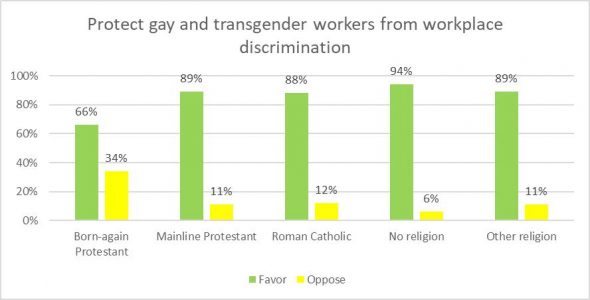Yes, Religion Matters in Election
Data shows religion can influence voters’ position on abortion -- and perhaps on GOP candidate for governor Tim Michels.

Tim Michels. Photo from Michels for Governor Facebook page.
A Milwaukee Journal Sentinel investigation of Tim Michels’ donations to various anti-abortion and anti-gay groups provoked outrage from Michels. In a fit of hyperbole, Michels said “I believe people should just, just be ready to get out on the streets with pitchforks and torches with how low the liberal media has become.” Michels’ attack suggests reporting on his donations is out of line and has no relevance to his political views or what sort of governor he would make.
In fact, the August 2022 Marquette Law School poll of Wisconsin respondents illustrates a strong connection between one’s religion and support for banning abortion. One question in the poll asked whether the respondent favored or opposed the recent Supreme Court ruling reversing the Roe v. Wade decision that had protected a woman’s right to an abortion. The percentage who said they support overruling Roe is shown in yellow; the percentage opposing the decision is shown in green.
court’s decision by a ratio of about two to one. The poll also reported results for five subgroups. These subgroups were based on the respondents’ self-reported religion: born again Protestant, mainline protestant, Roman Catholic, those saying they had no religion, and other religions.
Born again Protestants were the only subgroup in which the majority supported the court’s decision. Even in that case, support was not unanimous. More than a third (36%) of them opposed the court’s decision to reverse Roe.
Strikingly, despite near universal opposition to abortion from the Catholic Church’s hierarchy, a majority of Catholics were opposed to the court’s decision. In fact, the ratio of support to opposition was the same among Catholics as among all the respondents.
The strongest opposition to the court’s decision came from a growing group—those who said that they had no religion. Other than that group and the born-again Protestants, the remaining three groups split similarly to the total group, with a ratio of about two to one opposing the court decision.

Favor or oppose court decision striking down Roe
One month earlier, the Marquette poll put the same question to a national sample of voters. Before turning to that, however, it is useful to look at what the two polls reveal about the differences in religious makeup of Wisconsin voters and that of the US as a whole.
The next chart compares the five religious groupings as reflected in the two samples. The mix for July’s national poll is shown in blue. That for the August Wisconsin poll is shown in yellow. Moving left to right in the chart, the percentage of born-again Protestants was slightly higher nationally than in Wisconsin, likely a reflection of the dominance of born-again Protestant churches in the South.
(A recent report from Pew estimates that nationally the number of people saying they have no religious affiliation has been increasing and has reached 29%, while the number calling themselves Christian has decreased to 63%. Gallup estimates that church membership fell below 50% for the first time.)
Roman Catholics make up a larger portion of the Wisconsin sample than the national one. Both the group with no religion and those with “other religion” other than Catholic or Protestant are smaller in Wisconsin than in the national sample.

Religious mix of poll respondents
The next graph shows how members of the national sample responded to the question of whether they favored or opposed the court decision overturning abortion rights. This poll took place in July of 2022.
Compared to the Wisconsin poll, Born-again Protestants in the national sample were even more supportive of the court decision overturning Roe. By contrast, mainline Protestants were more strongly opposed to ending Roe than were those in the Wisconsin sample. And while a majority of Catholics in the national sample opposed ending Roe, that majority was smaller than in the Wisconsin sample.

Favor or oppose court decision striking down Roe, national sample
The Journal Sentinel article on Michels’ donations noted that in addition to giving to organizations opposing abortion, he was also supportive of organizations opposed to gay and transgender people. For example, the article notes that Michels donated $50,000 to Spring Creek Church in Pewaukee which his website identifies as his church. The JS article reported that the pastor of one church receiving a donation from Michels preached “that God believed transgender individuals were an ‘abomination’ and a ‘rebellion to their creator.’”
July national poll asked about the Supreme Court’s 2020 decision to include gay and transgender workers under the protection of a law against workplace discrimination.
The next graph shows the breakdown of the responses by the five religious categories. For simplicity I combined the percentage saying they were strongly or somewhat supportive and those who said they were strongly or somewhat opposed. Despite the negative comments from the preachers, most born again Protestants seem content with protecting gay and transgender workers against job discrimination.

Protect gay and transgender workers from workplace discrimination
Contrary to Michels’ outrage, patterns of charitable donations and their religious views can help us understand candidates’ political views and policies they may support. Opposition to abortion and support for laws banning abortion are closely correlated with religious beliefs.
Supporters of abortion bans, like Michels, like to claim that the product of conception is a “person.” They have a perfect right to believe that. However, saying that is a statement of belief, not of fact. In insisting that the state act on that belief, they are attempting to impose that belief on the majority in either Wisconsin or the nation, a majority that does not share their religious beliefs.
If you think stories like this are important, become a member of Urban Milwaukee and help support real, independent journalism. Plus you get some cool added benefits.
Data Wonk
-
Life Expectancy in Wisconsin vs. Other States
 Dec 10th, 2025 by Bruce Thompson
Dec 10th, 2025 by Bruce Thompson
-
How Republicans Opened the Door To Redistricting
 Nov 26th, 2025 by Bruce Thompson
Nov 26th, 2025 by Bruce Thompson
-
The Connection Between Life Expectancy, Poverty and Partisanship
 Nov 21st, 2025 by Bruce Thompson
Nov 21st, 2025 by Bruce Thompson





















As the author points out, religion does matter for some voters as a factor in determining who they might vote for. The fact is that regular attendance and membership in a church continues to decline. The ever increasing number of persons who declare “none” in terms of their religious beliefs continue to grow while some religious demonizations are losing influence because of sex abuse scandals or aligning their beliefs with bigoted right wing politicians.
I know they were callously lumped in with “other religions” but it would have been nice to see how pastafarians (Church of the Flying Spaghetti Monster) felt on these issues. Like Seinfeld’s “look to the cookie” maybe one day we will all wise up and “look to the noodle” and become pastafarians.
God love you Duane!
I am told HE welcomes all…..
🙂